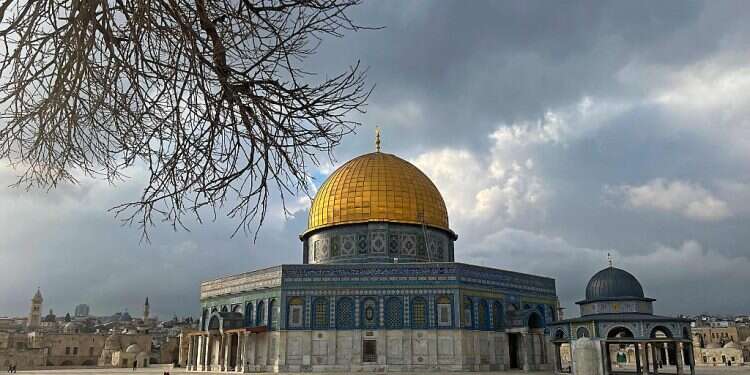A move to completely bar Israeli Arabs from entering the Al-Aqsa Mosque on the Temple Mount might let the genie out of the bottle in Jerusalem too – a genie that at least to date, Israel has succeeded in keeping trapped inside.
Follow Israel Hayom on Facebook, Twitter, and Instagram
A sweeping decision to prevent all residents of east Jerusalem and Israeli Arabs from gaining access to the Mount during Ramadan might push them off from their current position on the fence and force many of them to openly identify with Gaza, the various arms of Hamas and to play an active role in terrorism and carrying out attacks.
Israel has no interest in entering into any conflict – and certainly not a religious one – with Israeli Arabs and the residents of east Jerusalem. It would thus be much more advisable to listen to the position of the Jerusalem police force, whose smart and professional activity over the course of the last four months (alongside the Israel Security Agency, or Shin Bet as it is commonly known) has left the eastern part of the capital as a whole, and the Temple Mount in particular (apart from one or two select incidents), outside the events of this current war.
You can't argue with success: if the residents of east Jerusalem and Israeli Arabs were now at the eye of the storm, being part and parcel of the ongoing terrorism and acts of violence, then it would be politic to prevent them from entering the Mount. Since the reality of the situation, there is generally the opposite – there is no reason to push them in that direction by force, by enforcing a blanket closure of the Mount.
It would be far wiser to work with blacklists: to deny entry to the Mount to inciters, terrorists, and specific target populations, who have a long record of acts of provocation, rioting, and attacks on the Mount. This includes many residents of the Israeli Arab towns of Umm al-Fahm and Kafr Kanna, clear concentrations of the Northern Faction of the Islamic Movement in Israel, which was declared an unlawful organization some years ago.
Over the years, a number of terrorist attacks have originated from Umm al-Fahm. The most noteworthy of them, which was perpetrated on the Temple Mount in July 2017, ended in the murder of two police officers (Haiel Sitawe and Kamil Shnaan). The funeral of the murderers, who were shot dead by the police, became a vicious demonstration of hatred and hostility towards Israel, attended by some 10,000 local residents. During Operation Guardian of the Walls, in Kafr Kanna, where the arch-inciter, Sheikh Kamal al-Khatib, lives, violent mass riots took place.
In the Bedouin town of Hura in the Negev, there are certain parts of the local population that have given birth to ISIL members; and the Shu'afat refugee camp in east Jerusalem, a genuine hornet's nest in itself, has also been the breeding ground for numerous terrorists, who have gone on to murder or attempt to murder Jews, after being subject to incitement to believe the spurious blood libel of our generation: "Al-Aqsa is in danger."
Even if hundreds of Israeli Arabs have been documented since the start of the war in a broad variety of expressions of sympathy with Hamas or with the October 7 massacre, and even if thousands more have shared those thoughts but elected to remain silent, this still does not constitute sufficient grounds for preventing some two million people (21% of the population of Israel) from coming to the Mount during Ramadan and praying there.
However, the situation is somewhat different when it comes to the population of east Jerusalem. There, just as is the case in Judea and Samaria, the rate of support for Hamas is high, but the deterrence and the relative quiet that have been attained to date in these areas, coupled with the desire to preserve this, require the authorities to be wise rather than just right. The police and the Shin Bet in Jerusalem are sufficiently familiar with the various neighborhoods and the population across the eastern part of the city, in order to be able to fish out from among them those individuals who genuinely should be denied entry to the Mount, thus allowing the others to go and pray there.
The pot in east Jerusalem might be bubbling furiously but it has yet to boil over. When it does begin to spill over – then the rules of the game will have to change. In the meantime, in order to prevent it from spilling over, it is imperative to allow those relevant parts of the population of east Jerusalem to enter the Temple Mount during Ramadan. This is the "bitter pill" that Israel should swallow.
Subscribe to Israel Hayom's daily newsletter and never miss our top stories!




